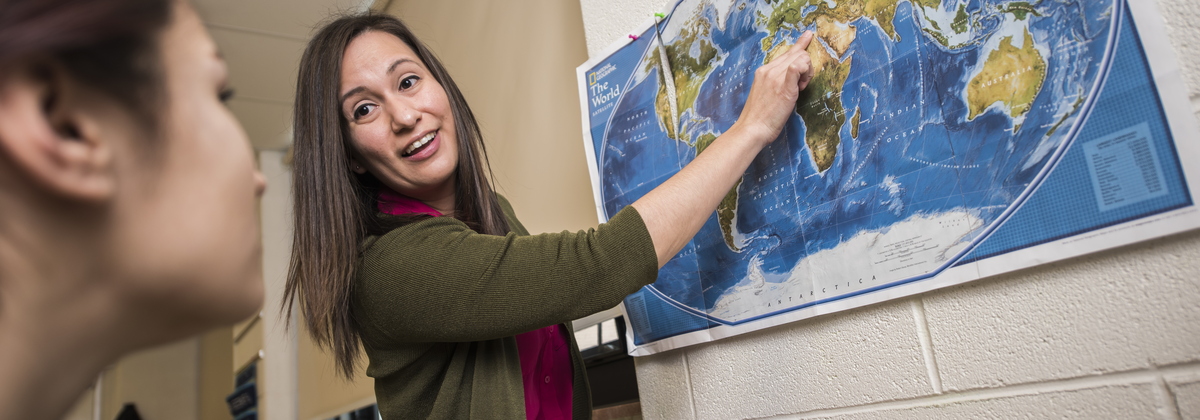- Educator Licensure, Secondary Science
- Licensure Areas
- Earth and Space Science
Earth and Space Science

Our earth and space science licensure program will prepare you to teach the following courses in grades nine to 12 at all levels, including honors and AP:
- Geology
- Astronomy
- Meteorology
- Related science courses
You'll also be able to teach introductory classes in:
- Biology
- Chemistry
- Physics
- Environmental science
The program consists of 36 credits taken over four semesters. If you're an undergraduate student, you'll most likely complete the program during your last two years at NIU, along with your upper-level content classes.
In order to enter the program, you must be pursuing a bachelor's degree in geology and environmental geoscience with an emphasis in earth and space science education at NIU. You're also eligible if you hold a bachelor's degree in a related discipline.
You must also have the following minimum GPA:
- Undergraduate: cumulative GPA of at least 2.50.
- Graduate: cumulative GPA of at least 3.00.
- GPA in all science and math courses must be at least 2.70.
You must complete the following requirements to earn your professional educator licensure with an endorsement in earth and space science.
Observations
During your clinical placements, you'll complete a minimum of 100 hours of observations in at least three different high school classrooms in the northern Illinois region.
Subject Matter Test
You must successfully pass the Illinois Licensure Testing System (ILTS) content test in earth and space science before student teaching.
EdTPA (Teacher Performance Assessment)
You must successfully pass the edTPA during student teaching in order to receive an Illinois teaching license.
Criminal Background Checks
The schools at which you complete your clinicals may require a criminal background check. You will learn how to complete this in your clinical classes.
Health Checks
You must pass a TB test prior to your third semester in the program. TB tests are available for free to NIU students at Health Services and are good for one year.
Required Coursework
In order to earn your license, you must complete all required courses with a grade of C- or better. If you earn a D or F, you must repeat the course.
Contact us for guidance on course requirements if you are a transfer student or if you already earned a bachelor's degree in a related discipline.
You can read detailed descriptions of the following required courses in the NIU catalog. Equivalent courses from other accredited institutions may be substituted at the discretion of the certification advisor.
Earth, Atmosphere, and Environment (32 Hours)
- EAE 103 - Planetary and Space Science or PHYS 162 - Elementary Astronomy (3 hours)
- EAE 105/106 - Weather, Climate, and You (3 hours/1 hour)
- EAE 120/121 - Planet Earth and Lab (3 hours/1 hour)
- EAE 200 - Geoscience Career Preparation (2 hours)
- EAE 325 - Solid Earth Composition (4 credits)
- EAE 340 - Sedimentology and Stratigraphy (4 hours)
- EAE 490 - Hydrogeology (3 hours)
- EAE 360 - Earth from Space: Introduction to Remote Sensing (3 hours) or MET 300 - Meteorology (4 hours)
- Upper-division course work in EAE (6 credits)
You must also take GEOG 105/106 Introduction to the Atmosphere (3 hours).
Chemistry (8 Hours)
- CHEM 210 General Chemistry I (3 hours), plus CHEM 212 Lab (1 hour)
- CHEM 211 General Chemistry II (3 hours), plus CHEM 213 Lab (1 hour)
Biology or Physics (8 Hours)
- BIOS 208 Fundamentals of Cellular Biology (3 hours), plus BIOS 210 Lab (1 hour)
- BIOS 209 Fundamentals of Organismal Biology (3 hours), plus BIOS 211 Lab (1 hour)
or
- PHYS 210 General Physics I, including lab (4 hours)
- PHYS 211 General Physics II, including lab (4 hours)
Math (3 Hours)
- MATH 229 Calculus I or MATH 211 Calculus for Business and Social Science (4 hours)
General Education
Your general education courses must include:
- Oral communication (3 hours)
- Written communication (3-6 hours): ENGL 103/104, ENGL 103/203 or ENGL 204
- Psychology (3 hours)
In most cases, you'll take licensure courses during the last four semesters before graduation. You'll be able to take upper-level content courses at the same time. During your final semester in the program, your entire schedule will consist of student teaching.
First Semester (Fall)
- ILAS 201 Introductory Clinical Experience (30 hours of observation, 1 credit)
- EPS 406 Human Development and Learning, Middle School and High School (3 credits)
- EAE 403 Nature of Scientific Inquiry (2 credits)
Second Semester (Spring)
- ILAS 301 Second Clinical Experience (30 hours of observation, 1 credit)
- LTIC 420 Methods and Materials for Teaching English to Speakers of Other Languages (3 credits)
- EAE 414 Interdisciplinary Teaching of Science in Secondary Education (3 credits)
- EPS 452: Classroom Management (3 credits)
Third Semester (Fall)
- EAE 401 Pre-student teaching clinical (40-plus hours of observation, 2 credits)
- EAE 416x had Methods in Teaching Earth and Space Science (3 credits)
- SESE 457 Integrating Exceptional Students in the Regular Classroom (3 credits)
Fourth Semester (Spring)
- EAE 428 Student Teaching (2 credits)
Contact Us
Educator Licensure, Secondary SciencePaul Fix, Director
LaTourette Hall 207
815-753-6819
pfix@niu.edu